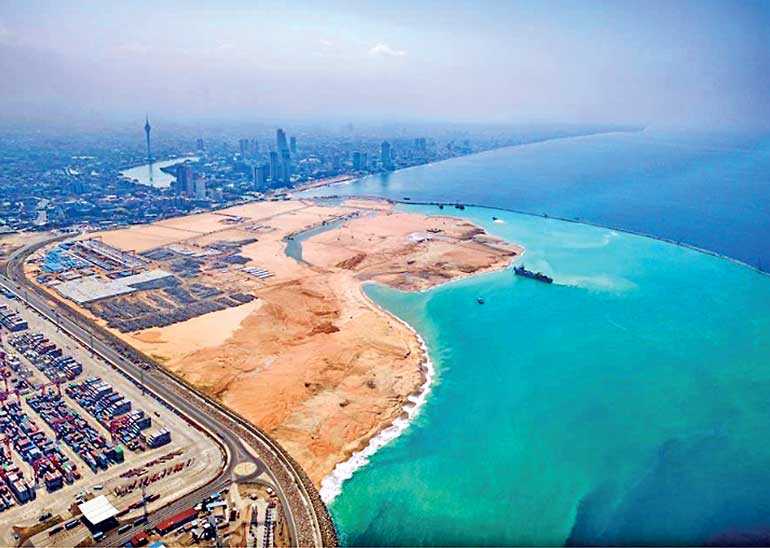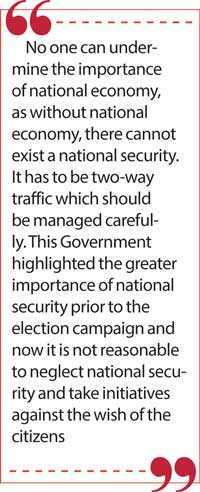Wednesday Feb 25, 2026
Wednesday Feb 25, 2026
Tuesday, 20 April 2021 00:10 - - {{hitsCtrl.values.hits}}

It is a fact that Port City will have a considerable positive impact on the country’s economy
 History
History
The original Colombo Port City project is acknowledged as the germination of an inspiration grown in the heart of former President Mahinda Rajapaksa, during the early period of his second term of office. Basically the project is to reclaim a part of the sea surrounding the southern part of the Colombo Harbour facing the Galle Face Green area. This concept advanced into an unsolicited proposal by the company that was engaged in the contract for land fill associated with the Colombo South Port Development, viz. China Harbour Engineering Company.
After a fairly long embryonic gestation period starting from March 2011, the project was launched by the Sri Lankan President on 17 September 2014. With an estimated investment of $ 1.5 billion by the Chinese Government, the project was to be carried out by China Harbour Engineering Corporation (CHEC), the investor selected company.
Economic importance of Port City
The project has been divided into three distinct stages. Firstly, reclamation, infrastructure development and land lease. Secondly construction and thirdly operation. The economic impact was analysed using five parameters. Firstly, employment opportunities, secondly, foreign direct invest coming to the economy, thirdly, balance of payment, fourthly, value addition and lastly, it is the Government revenue. It was estimated that during the construction and operational stages, the Port City will generate 175,000 and 200,000 jobs respectively. Another important aspect is knowledge transfers. It is a fact that Port City will have a considerable positive impact on the country’s economy.
In the process, several counter views have been expressed by critics in this regard involving concerns such as;
The writer wishes to draw readers’ attention to issues involving national security in relation to cede of Colombo Port City to China.
Territory of the Republic of Sri Lanka
The territory of the Republic of Sri Lanka shall consist of 25 administrative districts, and its territorial waters. The territorial waters of Sri Lanka extend 22 km (12nm) beyond the coastline and cover an area of about 21,500 sq. km. The contiguous zone is the band of water extending from the outer edge of the territorial sea to up to 24 nautical miles. In addition, the country enjoys rights to an un-mandated ‘exclusive economic zone’ (EEZ) that extends outward 370 km (200nm) from its shores and covers an area of about 510,000 sq. km. The Colombo Port City is an additional piece of land reclaimed from the ocean and added to the map of Sri Lanka. The new city will span on about 1,100 acres.
Port City Commission Bill challenge in Supreme Court
A special petition was filed with the Supreme Court on Thursday 15 April, challenging the Colombo Port City Economic Commission Bill which was presented to Parliament by the Government of Sri Lanka. The application was by Engineer Kapila Renuka Perera, the Chairman of the Association of Information Technology Professionals (AITP).
The petition notes the passage of the Colombo Port City Economic Commission Bill would threaten Sri Lanka’s economy and national security and therefore, requested the Supreme Court to issue an order that is should be passed by a 2/3 majority in Parliament or by a public referendum.
The petitioner informed the Supreme Court that the Colombo Port City Economic Commission Bill permits the transfer, sale, and lease of property within the Colombo Port City to another party, while it also has the power to permit another party to approve the visa of those employed in the Colombo Port City.
It was learned that altogether there had been more than 20 petitions filed against economic commission bill. Allowing the country’s financial controls, which are vested with the Parliament, to be given to another party and granting special tax relief threatens Sri Lanka’s economy as well as National Security. It is important and necessary to get the public opinion and concurrence prior to decide on any project which has serious security concerns and national interests.
National security – key to national survival
National security means the protection of the citizens of a country, its territorial integrity and sovereignty and its assets from outside threats. It is clearly stipulated in clause No. 1 of the Article 1 of the United Nations Declaration of 1945. A country’s national security should be framed to include the will of the countrymen, their needs, their views and after an in depth study of the overall strategies the state would adopt for the development of the country ensuring its prosperity as well.
National security derives from national interest and it differs from country to country. Big countries are globally bounded and small countries are more regional bounded. In this sense, Sri Lanka being a small country, her national security and national interest should have been aligned with more towards India. Miscalculation of this vital factor will inevitably result in a grave mistake in the national security in the future. One should not forget the fact, how India used LTTE to control Sri Lanka for nearly three decades.
National security does not only mean waging a war or arresting terrorists or the extremists, but it is a subject covering vast disciplines that are beneficial to the entire nation, not to one or two individuals. It is a very vast subject directly linked to national survival. Armed Forces, police and para military forces coming under the purview of national defence and unfortunately, many personnel even in the defence industry have misunderstood the only component of national security as Armed Forces.
It has a wider spectrum to include economic security, social security, energy security, cyber security, health security, food security, environmental security, intelligence security, individual security, military security, political security both domestic and international spheres are fallen well within the framework of national security. When political capability is weak, national security is threatened.
Politics can be viewed as the supreme capability of all in a state. National security in a given state is a kind of capability to safeguard national unity and territorial integrity making ties with other countries. National security can be termed as politics as well. The purpose of improving political capability is to maintain national security. Among all the national interest, the national security is the core. In other words, national security interest is the fundamental to maintain survival and development.
National security is the pre-condition for the existence of political activities. A great political capability of a country is an essential pillar of its security environment. In this context, a country with an advanced political system together with wise leadership, the economy, science and technology, culture, environment and citizens is faced with less threat from both internally and externally. In the end, wise political leadership and capability can be identified as the centre of gravity of national interest, national security and national survival. Readers are welcome to examine whether Sri Lanka has got similar political leadership.
Colombo has been trying its utmost to balance the great powers, but that may no longer be feasible
Sri Lanka is a weak country without any assurance of protection from major powers; it has no defence treaty with any country. On the other hand, neighbouring countries are seemingly taking sides between China and the US and its partner, India. This means that there is no effective system of diplomatic communication, which is a prerequisite for balancing behaviour, as it allows potential allies to recognise their shared interests and coordinate their responses. This is a stark difference from the Cold War period, where NAM ensured such diplomatic communication and a clear non-aligned bloc existed. All this makes balancing behaviour increasingly less feasible, despite the desire of the political establishment and recommendations of political and international relations scholars, as the great bifurcation takes place.
Sri Lankan foreign policy over the last 15 years, especially after the end of the civil war in 2009, can be described as a series of desperate attempts to balance the interests of major powers that have a keen interest of the country, which is strategically located at the heart of the Indian Ocean. The post-2009 agreements with competing countries, which have drawn Sri Lanka into the tensions between China and the United States and its allies, can be directly linked to the country’s economic woes. With the liberalisation of the economy, the gap between export earnings and import expenditure has been rising, with Sri Lanka now having a serious balance of payment crisis.
The largest part of the country’s foreign loan portfolio, estimated to be nearly 50%, is made up of dollar-denominated international sovereign bonds, followed by debts to the Asian Development Bank, Japan, China and the World Bank. While both Sri Lanka and China insist that these projects have no strategic, military or political dimension, the US and its allies are not convinced.
Port City should not be a threat to national security
Indian security point of view
Sri Lanka with a land mass of 65,610 sq. km. located in the southern tip of India, lies at the cross roads of all maritime routes in the region. About 70% of global oil trade and 50% of container traffic pass through the Indian Ocean. Today this sea route is operational with 36,000 ships passing through Sri Lanka’s Hambantota annually, including 4,500 oil tankers.
For imperialists, our part of the Ocean is not merely a market to be conquered or a source of raw materials to be pillaged. It is the gateway to the control of resources and markets in the Near East, Middle East, Africa and Asia.
During the past few years, Sri Lanka appears to have forged closer military relations with China. The rise of Chinese influence is elsewhere in the Indian Ocean Region (IOR) such as in Chittagong- Bangladesh, Gwadar-Pakistan, and Kayaukyu-Myanmar (Burma). Consequently, news reports examining China’s bilateral relations with Pakistan and Myanmar often make fleeting references to Sri Lanka’s deepening ties with China in an attempt to establish a broader pattern of Chinese activity in the IOR. It is important to be aware of the geo-strategically, geo- political and geo- social status of India and Sri Lanka to understand the sensitivity and the complexity of the security situation. The unique geographic position of Sri Lanka makes it a natural aircraft carrier.
Despite security assurances, Chinese consolidation of Sri Lankan ports remains a worry for India. The former diplomat, who retired as Indian ambassador to China last year, pointed out that given the location of Sri Lanka, India’s security was ‘inter-linked’ with its southern ocean. “We have that kind of relationship that we are mindful of each other’s sensitivities,” said Kantha. He hoped that India had got some ‘clarity’ on the security assurances, but Kantha was sceptical about their sustainability and believed that India should remain ‘watchful’.
“Even with assurances, usage can change over a period of time. If you look at Gwadar, it was meant to be a commercial port to be run by Singapore PSA. Then PSA was pushed out and Chinese moved in. Now talk is there of it being put in use as a naval facility for China,” he said. Senior Indian officials are concerned that a growing Chinese footprint risks violating Sri Lanka’s sovereignty and threatens India’s Southern flank and national security.
India-Sri Lanka relations get refreshed every time there is a change in the Parliament in Sri Lanka. The new Government is now emphasising its India – First policy in response to India’s ‘Neighbourhood First’ policy. This is apparently to indicate its willingness to factor in Indian sensitivity in its foreign and security policies. When playing the China card against India requires deeper analysis. Sri Lankan leaders and its people have perceived India as one of the potential sources of threat to its strategic autonomy. The experience so far suggests that Sri Lanka’s policy of balancing India through strategic engagement with an extra- regional power has mostly back-fired in the past. At a time Sri Lanka lost UNHCR vote, Government should try to avoid any kind of complications either from India and international community. Otherwise it will create an unnecessary security threat to Sri Lanka.
 American security point of view
American security point of view
After the collapse of the USSR, the USA remains the sole super power. Out of 193 countries which are coming under UNO in the world, Sri Lanka can claim no position in terms of geo- strategic and geo- political importance and naturally draws the attention of the super power. On the one hand the USA is fearful and worried about rising China as China to be the world number one economy very soon and it seems that China is slowly but surely getting closer to the objective.
USA being the sole super power in the world would not tolerate and wish to see China replacing the USA. In this context, the USA seems to be worried about the close friendship Sri Lanka is maintaining with China. Under these circumstances, USA has jumped to that conclusion and suspect Sri Lanka as a threat to its national security which Sri Lanka needs to be examined carefully in order to avoid being caught up in the cross fire between USA and China in the future.
US-Sri Lanka relations are based on shared democratic values and rules-based regional and international order. Currently US policy in Sri Lanka aims to support Sri Lanka’s democratic institutions, encourage its economic development, counter terrorism and promote a free, open and prosperous Indo- Pacific region. Both Governments intend to promote further economic cooperation and exchanges in maritime security and safety, and agree to pursue joint initiatives to enhance security, stability, transparency and economic opportunity for mutual benefit.
USA has shown its displeasure, the way Sri Lanka was being made to brazenly tilt towards China. During the US Secretary of State Michael R. Pompeo’s visit to Sri Lanka, he said, “Sri Lanka will soon have to pick a side in the China-US rivalry. Due to the fact that Sri Lanka is strategically located at the heart of the Indian Ocean has drawn Sri Lanka into tensions between China and the United States and its allies can be directly linked to the country’s national security. In this background, USA and its allied are not convinced of ceding Colombo Port City to China.
Sri Lankan security point of view
Whoever the president, whatever the government coming to power only for a temporary period of five years has no legal or ethical authority and right to either lease or sell national assets including an economic hub like Hambantota harbour and Colombo Port City to China or any other country for 99 years due to multiple security and other reasons. Whether it is called lease or investment, it is nothing but a sale of vital national asset.
What is the value of the asset estimated at the date of lease and in another 99 years? Will there be anyone who authorised the deal live to see the end of the deal? What will be the possibility of any citizen living including an infant today to witness the termination of the agreement after 99 years? Has the Government studied economic, security, cultural, social, environmental, International and political implications? Has the Government obtained the public wish or the opinion of the people as these international agreements will have a direct impact on national security and national survival in the long run?
In this backdrop, it seems obvious that whatever government in power has no ethical right to undermine the national security in the pretext of economic prosperity. No one can undermine the importance of national economy, as without national economy, there cannot exist a national security. It has to be two-way traffic which should be managed carefully. This Government highlighted the greater importance of national security prior to the election campaign and now it is not reasonable to neglect national security and take initiatives against the wish of the citizens.
A port city commission bill should be framed taking into consideration the will and wish of the countrymen , their needs, their views and after an in depth study of the overall strategies the state would adopt for the development of the country ensuring its prosperity as well. In this background, it appears that it is contradictory to what has been promised in ‘vistas of prosperity and splendour’ policy statement by the Government in terms of national security.
Therefore, Government should avoid signing any agreement with China in a hurry as it will affect the sovereignty, territorial integrity, national security and national survival in the future. Therefore, it is the responsibility of the legally elected Government of Sri Lanka to look into public good, not personal good.
Statement against SJB leader
In the meantime, in the Daily FT on Monday 12 April, the article titled ‘Is Port City not important’ written by the nickname prince of Kandy has concluded stating, “Son of mass murderer is unlikely to win an election and the sooner we all just get behind Ranil the better our chances someone competent redraft the port city legislation.”
It is evidently observed at the last page of the above write up, the writer has taken an effort to condemn SJB leader and promote Ranil Wickremesinghe in an unethical manner.
Wickremesinghe has been leading the party UNP since 1994. During his 26-year tenure, Wickremesinghe was blamed for repeated election losses. The UNP oldest party in the country was reduced to fourth place nationally with less than 3% of the vote. The UNP led by Wickremesinghe failed to win even a single seat from the districts. Under such circumstances, it is unrealistic to suggest that Ranil has a better chance to redraft the Port City legislation.
(The writer is an international researcher and international writer, and former Security Forces Commander Eastern Province and Wanni Region.)